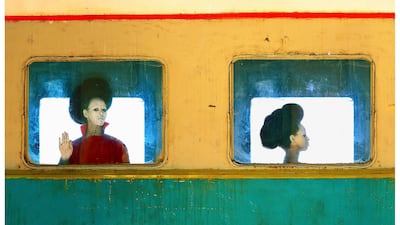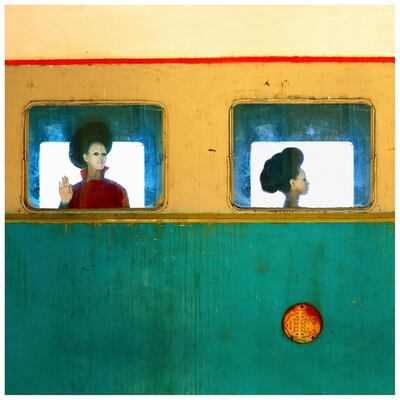The first thing you notice about Aida Muluneh’s photographs is colour. The reds, blues and yellows in her images – often portraits of African women – are stark and saturated, clearly chosen by a meticulous eye.
Muluneh’s visual style can be defined not just by her use of primary colours, which she sees as a logical step from the black and white photojournalism in her early career, but also by the precision of her compositions.
Her subjects are always impeccably styled and particularly still, at times rigid, in their poses.
This month, she was in Sharjah to give a tour of the two-part exhibition Homebound: A Journey in Photography, which traces her artistic development and is currently on view at the Sharjah Art Museum. Curated by Salah M Hassan and Sataan Al Hassan, it is presented by The Africa Institute as part of its year-long public programme on Ethiopia, launched last year.
The show includes The World is 9, a conceptual photo series from 2016 that features women in settings both real and surreal. Some of them are navigating bare landscapes, while others appear suspended in the skies. Inspired by traditional body art from Africa, Muluneh paints the faces and bodies of her female subjects deep red or bright white, then contrasts these colours with the ones in their vibrant dresses.
The way she develops her ideas is somewhat metaphysical: “It’s almost like a divine order,” she says. “But you have to be open to accept it… It’s me inside that frame. It’s an experience, a thought or a question I have.” Anything could spark an idea, she adds, a song or a word, then she continues the process by sketching and envisioning her photographs.
“I’ve lived in different parts of the world, which also has an influence on my perspective of humanity,” she says. Muluneh had what she calls an “itinerant childhood”. Born in 1974, she left her home country of Ethiopia at a young age, spending time in Yemen and England before heading off to boarding school in Cyprus and eventually moving to Canada.
She completed her degree in film from Howard University in Washington DC before becoming a photojournalist.
Read More
How a phone call with a stranger will make you a part of NYUAD's new interactive theatre experience
Emirati artist Mohamed Ahmed Ibrahim to represent the UAE at 2022 Venice Biennale
In 2007, she returned to Ethiopia for good, deciding she wanted to make her mark in her homeland. “Coming back has always been in my agenda. That was something that was put in me by my mother who always believed you have to go back to support your country.”
“It never made sense to not be in Ethiopia and have a conversation about Ethiopia or Africa. Coming back, it was, in a sense, relearning my culture, even though I grew up as an immigrant abroad and that culture was inside our home,” she continues.
Muluneh describes this return as an “educational process”, and she soon turned to conceptual photography to explore ideas that she couldn’t tackle in the more prescriptive confines of photojournalism.
Since then, her images, such as The 99 Series from 2013 and The Wolf You Feed from 2013, have had a more introspective and philosophical bend, considering issues such as morality and identity with elements from African traditions and history. "The key thing for me is that I cannot deny my Ethiopian roots in my work," she says.
Despite these references, however, Muluneh does away with stereotypical portrayals of Africa and Africans. She casts off the conventional signifiers with which we are familiar through mass media – whether it is dress or surroundings. Instead, she builds her own fantastical worlds and renders her subjects in striking colours, while drawing from Ethiopian and African influences.
It is part of what she tries to achieve with her work, including her current show in Sharjah. “I realised that there’s very limited visibility of images of Africa, outside of the exotic, that are being exhibited in the Middle East,” she says. “That is linked to how the Middle East perceives Africans as well.”
A sense of urgency towards the climate change 'crossroads'
Her efforts towards representation extends outside of her photography. In 2010, she established Addis FotoFest, which is the first international photography festival in East Africa and is the focus of the second part of the Homebound exhibition. Curated by the artist, the section features the work of photographers who have participated in the festival over the last near-decade, showcasing the breadth and depth of talent across the African continent.
More recently, Muluneh has turned her lens to environmental issues. Last year, she worked with the charity WaterAid to produce her Water is Life series, addressing the issue of water scarcity in Africa. Once again, the artist turns away from the typical imagery usually employed by charities, one of hardship or struggle. She instead weaves a narrative that highlights the role of women in accessing and bringing water to their families.
In her photographs, the women become sojourners carrying jerrycans – used in Africa to transport and store water – as they cross barren landscapes. Here, the story is not about their plight, but their strength.

The artist says that climate change remains the most pressing problem of our times. “We’re at a crossroads. Let’s forget about wars. Let’s forget about ethnic fighting. Let’s forget about all of it and look at the environment. It’s quite a sad state that we’re in. We’re busy being distracted by politics, but the existence of humanity is really at a crossroads,” she says.
With a new project in the works, Muluneh says that her focus will now be on filmmaking and on the power of the image to spur change and combat misinformation, especially in her native country. Her photographs about the environment will also continue, as she explains, “This is something that I will work on forever because there is an urgency to it.”
Homebound: A Journey in Photography is on view at Sharjah Art Museum until December 31. Virtual tours are also available on The Africa Institute website and Sharjah Art Museum website.













